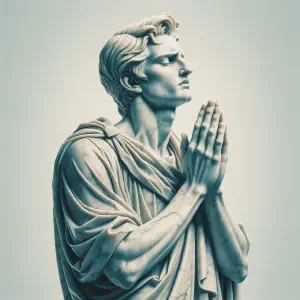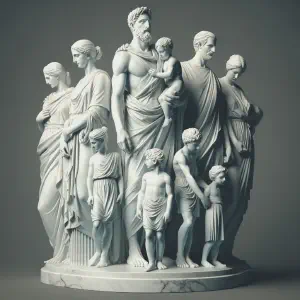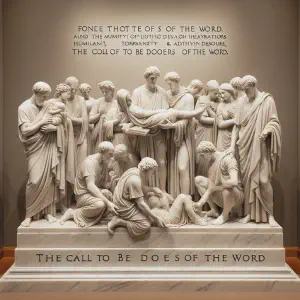The Vision of the Four Kingdoms
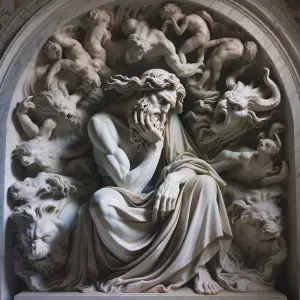
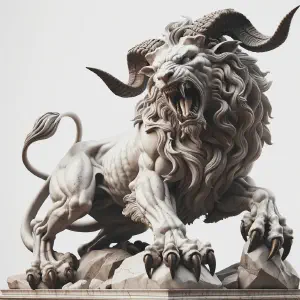
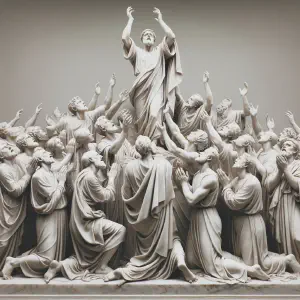
In the teachings of Jesus, a call to vigilance and prayer emerged, a beacon to guide the disciples through the tumults of life. He warned of the perils of complacency, urging them to be alert and steadfast in faith. As the world around them brimmed with distractions and anxieties, the message was clear: only through vigilance and prayer could they find the strength to face the trials ahead and stand with confidence before the Son of Man. In this exhortation, the echo of Daniel’s visions found its fulfillment, a reminder that in the midst of worldly kingdoms and trials, the ultimate victory belongs to those who remain faithful to the Most High.
Five Questions
What do the four beasts in Daniel’s vision represent, and how does this relate to the concept of earthly kingdoms?
The four beasts in Daniel’s vision symbolize four kingdoms that will arise on earth. Each beast represents a different kingdom, characterized by its own form of power and governance. This imagery reflects the transient nature of earthly kingdoms, highlighting the contrast between human political structures and the eternal kingdom of the Divine. The vision serves as a reminder that while earthly kingdoms rise and fall, God’s dominion remains supreme and everlasting.
How does the fourth beast differ from the others, and what does it signify in the broader context of the prophecy?
The fourth beast stands out due to its terrifying and destructive nature, described as having iron teeth and bronze claws, trampling and devouring everything in its path. This beast symbolizes a kingdom that is far more powerful and oppressive than its predecessors. In the broader context of the prophecy, it represents a culmination of worldly power and corruption, leading to a period of great trial and tribulation for the faithful. This imagery underscores the challenges the faithful will face but also sets the stage for the ultimate triumph of God’s kingdom.
What is the significance of the ‘holy ones’ in Daniel’s vision, and how do they relate to the concept of an everlasting kingdom?
The ‘holy ones’ in Daniel’s vision refer to the faithful followers of God who endure trials and tribulations. Their significance lies in their ultimate victory and inheritance of an everlasting kingdom, as promised by God. This concept is pivotal as it emphasizes the triumph of spiritual faithfulness and righteousness over worldly power and oppression. The everlasting kingdom granted to the holy ones represents the eternal nature of God’s dominion and the reward for those who remain steadfast in their faith amidst adversity.
In the context of these scriptures, how does the message of Jesus in Luke 21:34-36 about vigilance and prayer complement the visions of Daniel?
Jesus’ message about vigilance and prayer in Luke 21:34-36 serves as a practical and spiritual complement to Daniel’s visions. While Daniel’s prophecy outlines the grand narrative of kingdoms and spiritual warfare, Jesus’ teachings provide guidance on how to live in such times. He emphasizes the importance of remaining spiritually awake and prayerful, warning against complacency and the distractions of worldly life. This guidance is crucial for the faithful to navigate the trials foretold in Daniel’s visions and to be prepared for the coming of the Son of Man.
What are the overarching spiritual lessons that can be drawn from these scriptures for believers today?
The overarching spiritual lessons from these scriptures include the transience of earthly power and the supremacy of God’s eternal kingdom. Believers are called to recognize the temporary nature of worldly dominions and to focus on the lasting truth of God’s sovereignty. The scriptures also emphasize the importance of remaining faithful, vigilant, and prayerful, especially in times of trials and tribulations. The promise of an everlasting kingdom to the holy ones serves as a beacon of hope, encouraging believers to persevere in their faith and to live in anticipation of God’s ultimate judgment and salvation.
Bible Study
Daniel 7:15-27
I, Daniel, found my spirit anguished within its covering of flesh,
and I was terrified by the visions of my mind.
I approached one of those present
and asked him what all this meant in truth;
in answer, he made known to me the meaning of the things:
“These four great beasts stand for four kingdoms
which shall arise on the earth.
But the holy ones of the Most High shall receive the kingship,
to possess it forever and ever.”
But I wished to make certain about the fourth beast,
so very terrible and different from the others,
devouring and crushing with its iron teeth and bronze claws,
and trampling with its feet what was left;
about the ten horns on its head, and the other one that sprang up,
before which three horns fell;
about the horn with the eyes and the mouth that spoke arrogantly,
which appeared greater than its fellows.
For, as I watched, that horn made war against the holy ones
and was victorious until the Ancient One arrived;
judgment was pronounced in favor of the holy ones of the Most High,
and the time came when the holy ones possessed the kingdom.
He answered me thus:
“The fourth beast shall be a fourth kingdom on earth
different from all the others;
It shall devour the whole earth,
beat it down, and crush it.
The ten horns shall be ten kings
rising out of that kingdom;
another shall rise up after them,
Different from those before him,
who shall lay low three kings.
He shall speak against the Most High
and oppress the holy ones of the Most High,
thinking to change the feast days and the law.
They shall be handed over to him
for a year, two years, and a half-year.
But when the court is convened,
and his power is taken away
by final and absolute destruction,
Then the kingship and dominion and majesty
of all the kingdoms under the heavens
shall be given to the holy people of the Most High,
Whose Kingdom shall be everlasting:
all dominions shall serve and obey him.”
In Daniel 7:15-27, the prophet Daniel, known for his faithfulness to God in the Babylonian captivity, experiences a vision of four beasts representing successive earthly kingdoms. This passage aligns with Catholic teachings on the temporality of earthly power and the ultimate sovereignty of God. The prophecy foreshadows the trials the faithful will endure under oppressive regimes, reflecting themes of perseverance and divine justice found in Catholic teachings, such as the Acts of Mercy and the virtues of faith and patience.
Daniel 3:82-87
R. Give glory and eternal praise to him.
“You sons of men, bless the Lord;
praise and exalt him above all forever.”
R. Give glory and eternal praise to him.
“O Israel, bless the Lord;
praise and exalt him above all forever.”
R. Give glory and eternal praise to him.
“Priests of the Lord, bless the Lord;
praise and exalt him above all forever.”
R. Give glory and eternal praise to him.
“Servants of the Lord, bless the Lord;
praise and exalt him above all forever.”
R. Give glory and eternal praise to him.
“Spirits and souls of the just, bless the Lord;
praise and exalt him above all forever.”
R. Give glory and eternal praise to him.
“Holy men of humble heart, bless the Lord;
praise and exalt him above all forever.”
R. Give glory and eternal praise to him.
This section of Daniel 3 features a hymn of praise from various groups, including men, Israel, priests, servants, spirits and souls of the just, and humble-hearted men. It emphasizes the universal call to worship God, a central theme in Catholicism. The passage aligns with the First Commandment, emphasizing the worship of God alone. It also reflects Catholic values of humility, community in faith, and the universal call to holiness, as described in the Catechism of the Catholic Church.
Luke 21:34-36
Jesus said to his disciples:
“Beware that your hearts do not become drowsy
from carousing and drunkenness
and the anxieties of daily life,
and that day catch you by surprise like a trap.
For that day will assault everyone
who lives on the face of the earth.
Be vigilant at all times
and pray that you have the strength
to escape the tribulations that are imminent
and to stand before the Son of Man.”
In Luke 21:34-36, Jesus Christ, the central figure of Christianity, admonishes his disciples to remain vigilant and prayerful in anticipation of the end times and His second coming. This passage echoes Catholic values of vigilance in faith, prayer, and preparedness for final judgment, as emphasized in the Catechism. It aligns with the teachings on the virtue of hope and the need for grace to withstand trials. The call to avoid worldly distractions resonates with the Catholic emphasis on temperance and prudence, virtues essential for spiritual readiness.
Lessons
These passages teach us about the transience of earthly powers and the enduring sovereignty of the Divine. Daniel’s vision of the four beasts symbolizes the rise and fall of earthly kingdoms, contrasting with the eternal kingship granted to the holy ones of the Most High. The faithful’s hymns of praise in Daniel and the exhortation of Jesus to vigilance and prayer in Luke underscore the importance of remaining steadfast in faith amidst life’s tribulations. We are reminded to focus on spiritual preparedness, worshipping God wholeheartedly, and staying vigilant in prayer, thus ensuring our readiness to face the ultimate judgment and receive the promise of God’s eternal kingdom.
Meditation Prayer
